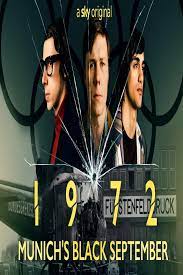
1972: MUNICH's BLACK SEPTEMBER
Germany, 2022, 92 minutes, Colour.
Directed by Christian Stiefenhofer.
The title almost tells it all. 1972 was the year of the Olympic Games set in Munich, a return to Germany after the experience of the Olympic Games in Berlin in 1936 and Hitler’s presence. But, Palestinian terrorist attack the Israeli athletes, abducting them, killing them, the response of the German authorities, the fate of the Palestinians, some killed, some arrested and deported.
This film was released on the 50th anniversary of these events.
There was a television film in the 1970s, not long after the events, 24 hours in Munich with William Holden. In 2005, Stephen Spielberg dramatise the events and the consequences in Munich, with a cast led by Eric Bana. There have been several documentaries over the 50 years.
The framework of this documentary is one of the German police, almost 50 years after the event, having participated in the action, deciding to visit the widow of one of the athletes. He is accompanied to Israel by his daughter for translation purposes. The film frequently goes back to the meetings, the conversations, the memories, including flashbacks, the regrets, and the strong-minded widow appreciative of the visit.
As expected, there are quite a number of interviews with survivors, some of the Israeli team who are not abducted, many members of the German police, politicians at the time, even an interview with one of the Palestinians, whose location is not identified and in this film from the back, introducing the Palestinian perspective on Israel.
The film also has great advantage of so much newsreel and television footage which brings the action once again to life.
And, the film uses the device of dramatic re-enactments, especially in the portrait of the Palestinians, their arrival in Munich, the accommodation the hotel, the discussions about the motivation – and later images of them, their Palestinian idealism, to make a protest because Palestine was excluded by the Olympic Committee, to make their presence felt. However, it led to a massacre.
One of the main criticisms of the film is of the German authorities, some re-enactments of the discussions, the planning, the young age of so many of the volunteers (around 21), their inexperience, on the plane, their wanting to retreat, the shooting, the death of a policeman.
There is also footage of gold in my year, Prime Minister in Israel at the time, quite relentless in her attitude towards the Palestinians and the uprising. By contrast there are scenes of Willy Brandt and his explanations of the situation.
It is valuable to look back on past crises, to acknowledge the realities of past, but to reinterpret them with hindsight, in this case the hindsight of 50 years.